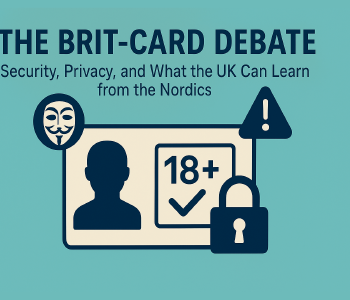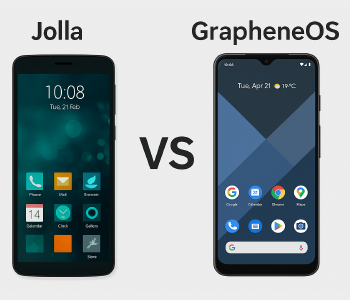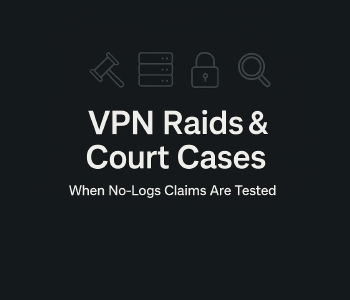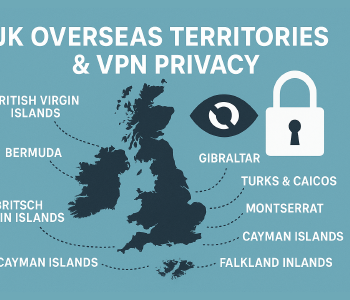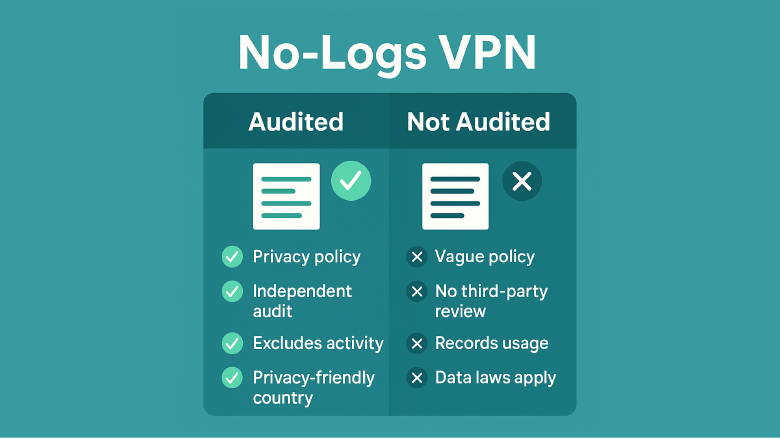
Why No-Logs VPNs Matter (And How They’re Audited)
If you’re using a VPN to stay private online, there’s one phrase you’ve probably seen everywhere: no-logs.
Most VPNs claim it. But what does it actually mean? Can you trust it? And how do you know if a VPN provider is really sticking to that promise — or just saying what sounds good?
Let’s break it down.
🧾 What Is a No-Logs VPN?
A no-logs VPN is a VPN service that doesn’t keep records of what you do online.
That means:
- No browsing history
- No connection timestamps
- No IP address logs
- No traffic metadata (like how long you’re online or what you’re downloading)
Some VPNs may log minimal operational data (like the date of your last login or how many devices you’re using), but a strict no-logs policy avoids collecting anything that could tie your activity back to you.
🚨 Why Does It Matter?
Here’s the thing: when you use a VPN, all your internet traffic is routed through their servers. That puts the provider in a position of trust — they could technically see what sites you visit, when you log in, how long you stay, and more.
If that data is stored — even temporarily — it can:
- Be handed over to governments if legally requested
- Be exposed in a data breach or hack
- Be used internally for profiling or advertising
A real no-logs policy removes that risk. If there’s nothing saved, there’s nothing to steal, subpoena, or sell.
This is especially important if you:
- Travel to countries with censorship or surveillance
- Download torrents or use P2P
- Use public Wi-Fi regularly
- Just don’t want your online habits tracked
🕵️ But How Do You Know They’re Telling the Truth?
That’s the hard part.
Some providers say “no logs,” but hide the fine print in their privacy policies. Others might log more than they admit — and there’s no way to check… unless there’s an audit.
This is where independent audits come in.
🔍 What’s a No-Logs Audit?
A no-logs audit is when a third-party security firm examines a VPN’s servers, infrastructure, and code — usually under strict conditions — to check whether the provider is keeping its promises.
The audit typically covers:
- Whether any personally identifiable info is being stored
- How data is handled in real time
- What’s written in the logs (if anything)
- Whether the privacy policy matches what’s really happening
Most top VPNs invite reputable auditing firms like Cure53, Deloitte, or Securitum to run these checks. The best part? They publish the results for everyone to see.
If a VPN hasn’t had a no-logs audit (or keeps it private), that’s a red flag.
🧠 Not All Audits Are Equal
Some VPNs try to get away with half-measures — like:
- Only auditing a small part of their infrastructure
- Running a one-time audit years ago
- Publishing vague summaries instead of full reports
When looking at an audit, ask:
- Who ran it? Is it an independent, respected firm?
- When was it done? Has it been updated recently?
- What did they check? Just the apps, or the servers too?
- What did they find? Were there any issues — and how were they fixed?
The more transparent a provider is about all this, the better.
🏆 VPNs That Have Passed No-Logs Audits
Here are a few well-known VPNs that have had public, independent audits of their no-logs claims:
-
Proton VPN
Proton VPN were audited by Securitum (2022 and 2024). No logs found. Full audit available online. -
ExpressVPN
Audited multiple times by PwC and Cure53. Also tested in real-world legal situations. Passed. -
Private Internet Access (PIA)
Had a Deloitte audit, but also proven in court — multiple times — that it couldn’t hand over logs because none existed. -
Surfshark
Passed a Cure53 audit for security and had a no-logs audit in 2023.
Keep in mind: audits aren’t perfect, but they’re one of the best ways to verify trust in a VPN.
⚖️ Legal Jurisdiction Matters Too
A VPN might say “no logs,” but if they’re based in a country with mandatory data laws, they could be forced to change that policy.
That’s why many privacy-focused users prefer VPNs based outside the 5/9/14 Eyes surveillance alliances. Countries like:
- Switzerland
- Panama
- Iceland
- British Virgin Islands
These locations usually offer stronger legal protection — especially when combined with transparent policies and proven audits.
✅ How to Spot a Trustworthy No-Logs VPN
When picking a VPN, don’t stop at “no logs” on the homepage. Dig deeper. Ask:
- Does the privacy policy clearly say what they log — or don’t?
- Have they passed a third-party audit (and shared it)?
- Are they based in a privacy-friendly country?
- Do they allow anonymous payments (like crypto or cash)?
- Are their apps open-source or security-reviewed?
If the answer is yes to most of those, you’re probably in good hands.
🔐 Final Thought
Lots of VPNs talk about privacy. But only a few can prove it.
A no-logs policy isn’t just a marketing phrase — it’s a commitment. And when it’s backed by independent audits, clear privacy policies, and the right jurisdiction, that’s when it really means something.
If you’re using a VPN to stay private, make sure it’s one that won’t keep a record of what you’re doing. Otherwise, you’re just moving your trust from your ISP to a VPN — and hoping they keep their word.



